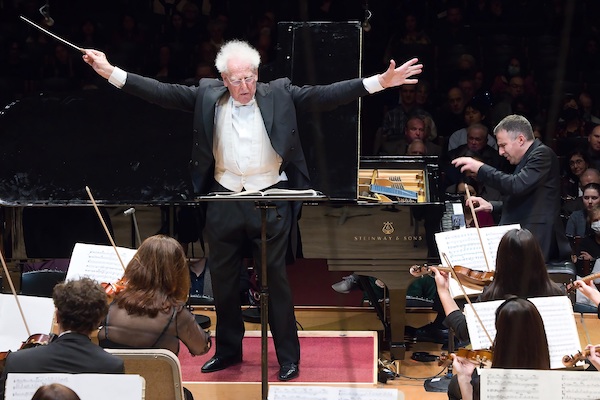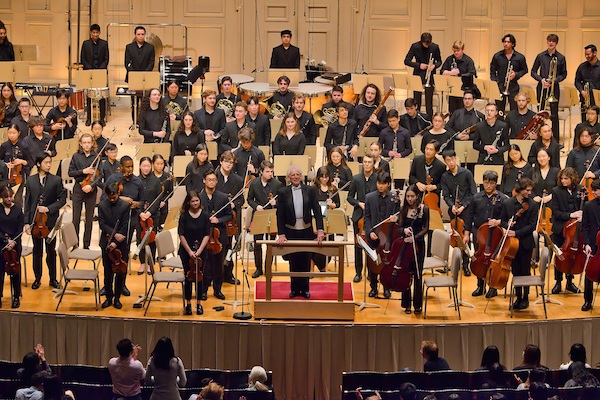Classical Album & Streaming Reviews: “Spanish Impressions,” Boston Philharmonic Orchestra & Boston Philharmonic Youth Orchestra in Concert
By Jonathan Blumhofer
An admiring review of the latest disc from Hermitage Trio and praise for Boston Philharmonic and Boston Philharmonic Youth Orchestra concerts earlier this month at Symphony Hall.
 Strangely, given the enduring influence and popularity of Spanish musical forms, Iberian composers and their music remain somewhat on the edges of the standard concert repertoire. That this shouldn’t be the situation is made clear by a new release from the Hermitage Trio, Spanish Impressions, which offers a substantial and brilliantly played survey of music from that country composed over the last century or so.
Strangely, given the enduring influence and popularity of Spanish musical forms, Iberian composers and their music remain somewhat on the edges of the standard concert repertoire. That this shouldn’t be the situation is made clear by a new release from the Hermitage Trio, Spanish Impressions, which offers a substantial and brilliantly played survey of music from that country composed over the last century or so.
The Hermitage’s program consists of a winning mix of heavy-hitting and lighter works. Among the latter are Enrique Arbós’s soulful Trois Pièces originales dans le genre Espagnol and Mariano Perelló’s sometimes fervent, sometimes snapping Tres impresiones, both of which traffic in familiar forms (boleros, habaneras, seguedillas, and the like) and gestures (imitations of strumming guitars).
Joaquín Turina’s Piano Trio No. 2, on the other hand, feels boldly etched — though it only lasts about 15 minutes. Its three movements indulge in a variety of contrasting ideas, all of which come across strongly in the Hermitage’s reading.
Here, the opening Lento is a picture of textural, tonal, and expressively right playing. In the second movement, the ensemble revels in the score’s treatment of instrumental families as discreet rhythmic and textural units. The finale, impeccably in tune, nimbly navigates Turina’s discursive presentation of new and familiar musical ideas.
A similar flexibility of approach also marks the Hermitage’s account of the album’s most substantial item, Gaspar Cassadó’s Trio in C. Given the composer’s other career as one of the 20th century’s great cellists, it comes as no surprise that the writing for his instrument here is exacting and enormously demanding.
Yet cellist Sergey Antonov makes it all sound, if not exactly easy, then at least totally natural. His duets in the work with violinist Misha Keylin are beautifully unified and often dreamy. Pianist Ilya Kazantsev’s contributions are likewise spirited: he lets loose with particular brio in the Rondo’s clangorous denouement.
But nothing quite tops the Hermitage’s take on the Trio’s peculiar second movement. Mixing ghostly, cheeky, and cryptic gestures with becoming logic, this strange and unpredictable section ultimately adds up to far more than the sum of its parts: like the album in microcosm, it is a bracing, rhapsodic drama.

Benjamin Zander conducting the Boston Philharmonic with Benjamin Hochman. Photo: Hilary Scott
One of Cassadó’s former cello students is the conductor Benjamin Zander, who led his Boston Philharmonic (BPO) and Boston Philharmonic Youth Orchestras (BPYO) in concerts earlier this month at Symphony Hall. Both performances were available to stream via the orchestras’ website (which is how I heard them) and are well worth investigating when they migrate to the ensemble’s YouTube channel (or the conductor’s website).
This is a big year for Zander and the Philharmonic: the former celebrates his 85th birthday in March and the ensemble is currently in the middle of its 45th season. Yet the festivities have been tempered somewhat by the unexpected death in September of the maestro’s former wife, Rosamund Stone Zander. Despite their separation, the two remained close friends and Stone Zander was a guiding spiritual and philosophical light for both orchestras.
That fact was at the heart of the BPO’s concert taped last Friday, which paired dark-hued pieces by Benjamin Britten and Dmitri Shostakovich with Béla Bartók’s Piano Concerto No. 3.
Benjamin Hochman was the soloist in the last. Playing with a light touch and impressive textural clarity, he delivered a fresh, inviting performance that was highlighted by a rapturous account of the Concerto’s transcendent second movement.
Zander and the Philharmonic provided a warm, well-directed accompaniment, one that was often appealingly conversational and impressively balanced with the pianist. Afterwards, Hochman offered the “Sarabande” from Bach’s C-minor Partita as an introspective encore.
Those who’ve followed the BPO and BPYO long enough might recall a gripping, dancing performance of the Shostakovich Tenth Symphony Zander led with the Youth Orchestra in 2018. Friday’s account of the same work moved similarly (especially in the Allegretto), though this iteration came with a touch more melancholy than before.
To be sure, this was a reading that wrestled with suffering, hardship, and loss. But still it persevered, sometimes angrily and defiantly (like in the furious second movement), sometimes wistfully (as in the big first).
Ultimately, though, Zander’s Shostakovich was affirmative: the finale’s coda rang triumphantly in spite — or, perhaps, because — of all it took to arrive at that point. The process included some exquisite brass and woodwind contributions, not least of which were the solo turns from principal oboe Peggy Pearson and principal clarinet Rane Moore.
More terrific solos, these from principal violist Noriko Futagami, anchored the night’s performance of the Passacaglia from Britten’s opera Peter Grimes. Zander’s was a vigorous yet harrowing traversal of this mysterious score, whose repeating bass line emerged with implacable force.
Vigor and energy — though not the Passacaglia’s terrors — marked the BPYO’s concert from back on November 5. Their indestructibly Germanic program, which opened the group’s 12th season, featured music by Richard Wager, Paul Hindemith, and Johannes Brahms.
The ensemble’s Meistersinger Overture launched the event promisingly: plush, noble, beautifully blended. Zander lingered over some of the lyrical spots, but, given how well this orchestra plays, who could blame him? A couple of loose seams notwithstanding, this was some terrific Wagner, full of warmth and character, ending in a blaze of sonic light.

Benjamin Zander and the Boston Philharmonic Youth Orchestra. Photo: Hilary Scott
Those same aspects also marked the BPYO’s account of Hindemith’s Symphonic Metamorphosis on Themes by Carl Maria von Weber. The cumbersome title of this 1943 piece aside, this is as direct and wickedly personable a score as any in the canon. It’s clearly a Zander favorite — he last programmed the Metamorphosis with these forces in 2017 — and one can forgive its relatively quick reappearance on account of the orchestra’s swaggering, rhythmically crisp performance here.
The fast movements, highlighted by a bristling “Turandot, Scherzo” and propulsive closing “March,” were rightly exhilarating. Meanwhile, the Andantino functioned as a delicate, if slightly detached, respite.
Afterwards came the Brahms First Symphony in a reading that was full of color and direction, the reflective moments warm and well-blended, the fast ones snapping right along. Despite a few hiccups in the ensemble in the last two movements, the BPYO’s performance didn’t stint on might or character.
Indeed, Zander’s grasp of the music’s architecture ensured a purposeful flow. For icing (as it were), virtually all the Symphony’s solos — particularly those from concertmaster Darwin Chang and principal horn Graham Lovely — were dispatched with elegance and majesty.
Typically, if the Youth Orchestra gives an encore, it will be “Nimrod” from Elgar’s Enigma Variations. There was nothing to follow the Brahms on November 5, but Zander borrowed the piece from his young charges last weekend and played it as a post-Shostakovich memorial to his recently departed former wife.
As usual, he prefaced the reading by reminding the audience that this music, so often heard in a funereal context, isn’t actually about death: rather, it’s a testament to friendship and love. So it sounded here, tying together the night’s — and this bittersweet season’s — threads of loss, memory, and hope with poignancy, warmth, and not a drop of sentimental excess.
Jonathan Blumhofer is a composer and violist who has been active in the greater Boston area since 2004. His music has received numerous awards and been performed by various ensembles, including the American Composers Orchestra, Kiev Philharmonic, Camerata Chicago, Xanthos Ensemble, and Juventas New Music Group. Since receiving his doctorate from Boston University in 2010, Jon has taught at Clark University, Worcester Polytechnic Institute, and online for the University of Phoenix, in addition to writing music criticism for the Worcester Telegram & Gazette.
